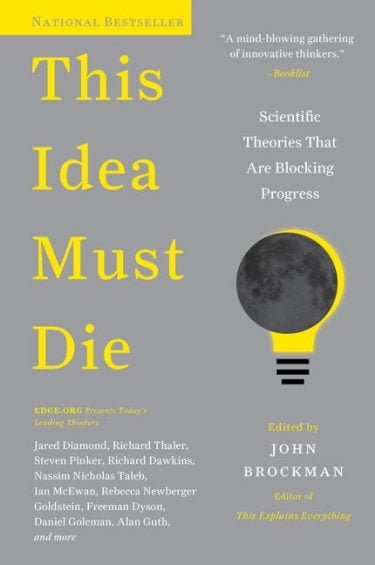This Idea Must Die: Scientific Theories That Are Blocking Progress
John Brockman
ISBN-10: 0062374346

Every year, John Brockman flings a question at hundreds of scientists, philosophers and others, and edits their answers into a book. These books become great resources: collections of ideas and insights that are variously provocative, inspiring or illuminating. There are exceptions to the general quality control, but these are swamped by the huge amount of worthwhile essays, each only about a couple of pages long.
For this collection, Brockman was on the hunt for scientific ideas that ought to be retired.
Kai Krause would be glad to see the back of the uncertainty principle, suggesting that Heisenberg’s idea lost something in translation from Unschärferelation – literally, “unsharpness relationship” – to uncertainty principle, possibly due to Eddington’s influence.
As sometimes happens in Brockman’s compilations, consecutive essays may have the same title and target. Pascal Boyer and Laura Betzig both give the thumbs-down to Culture as an item. For Boyer, the notion of culture is no more useful than the idea of phlogiston. Betzig rejects the idea that there is something superzoological called “culture” that directs the course of events, on the grounds that “the laws that apply to animals apply to us”. For John Tooby, dumping the culture concept isn’t enough: learning must go too: “Like protoplasm, culture and learning are black boxes, imputed to have impossible properties and masquerading as explanations.”
Douglas Rushkoff lowers the tone somewhat, with The Atheism Prerequisite. Bemoaning materialism, he seems to think that our sense of purpose straightforwardly indicates that human consciousness itself has a purpose. Oblivious of Occam’s Razor, he imagines that scientists have godlessness as “a foundational principle of scientific reasoning”.
Charles Seife argues that the use of statistical significance has degenerated to become “a quantitative justification for dressing nonsense up in the mantle of respectability… it’s the single biggest reason that most of the scientific and medical literature isn’t worth the paper it’s written on”.
Gerd Gigerenzer, in Scientific inference via statistical rituals, delivers a scathing critique of the ritual use of p-values in scientific papers: “The number “5 percent” is held sacred, allegedly telling us the difference between a real effect and random noise… The delusions are striking. If psychiatrists had any appreciation of statistics, they would have entered these aberrations into the Diagnostic and Statistical Manual of Mental Disorders.”
Some of this may be discomforting reading for those of us who are supporters or advocates of science, but of course criticism is part of the whole process, is it not?
Alex Holcombe’s proposal of an idea for the chop is: Science is self-correcting.
Paul Taylor



